
16 minute read
Making chemistry accessible for next generation
$1.3 MILLION GRANT USED TO IMPACT QUALITY OF LIFE, MAKING CHEMISTRY ACCESSIBLE FOR NEXT GENERATION
By Sarah Nicholas
Advertisement
More than $1.3 million is now helping two Mississippi State assistant professors who aim to make the field of chemistry more accessible to underserved areas of Mississippi. With a grant from the National Science Foundation Early Career Program, the project will promote chemistry’s importance, as well as its entertaining attributes, to the state’s youth.
Xin Cui and Colleen N. Scott are receiving the 2020 CAREER awards from the NSF’s prestigious Faculty Early Career Development Program, which recognizes outstanding faculty exhibiting potential as academic role models in research and education. The award also is given for leadership in advancement of departmental or organizational missions.
“The NSF-CAREER Award is the pinnacle achievement for junior faculty and today remains the single most prestigious and central pre-tenure goal, measure and validation of our research and education competitiveness,” said Dennis W. Smith Jr., MSU Department of Chemistry professor and head.
Cui received the CAREER award, in part, for his efforts to spotlight chemistry education, encouraging young students who need help with chemistry coursework and want to pursue STEM degrees and careers. He has a specific focus of reaching students from underserved regions in Mississippi, which he said exhibit much larger gaps in educational performance from the national average.
“To grow the economy, advance the infrastructure, attract more populations are all generations-long efforts. This calls for education as its foundation. Particularly, STEM is directly related to the production, construction and innovation that leads to new products and processes that sustain our economy,” Cui said.
In addition to the chemistry department, Cui partners with the departments of chemical engineering and geosciences, the Office of Institutional Diversity and Inclusion, and the T.K. Martin Center for Technology and Disability, while also seeking alliances with organizations beyond the university.
Using a “student-to-student” format, Cui said the goal of his outreach effort is to popularize modern organic chemistry concepts and familiarize youth with real-life applications, while also encouraging MSU and other university undergraduate students “to grow into experienced future educators.”
Because of COVID-19, Cui said he is focusing on popularizing scientific topics by using internet platforms, including online meetings and videos.
Cui said the appeal of synthetic organic chemistry is to impact and improve quality of life, and he hopes to impact diverse groups of young generations.
“The preeminent goal of synthetic organic chemistry is the efficient construction of molecules from readily available starting materials,” he said. “Obtaining new molecules brings new opportunities for the widest spectrum of developments humans are pursuing, from new pharmaceuticals and agrochemicals to next-generation materials.”
“With pharmaceutically important and biologically active molecules as targets, our research investigates three-dimensional behavior of chemical transformations, which is key to stereoselective production of drug candidates and bioactive molecules,” Cui explained.
Like Cui, Scott received the CAREER award for her efforts in making chemistry impactful, accessible and understandable to the next generation.
Her research aims to extend the longevity of materials used in
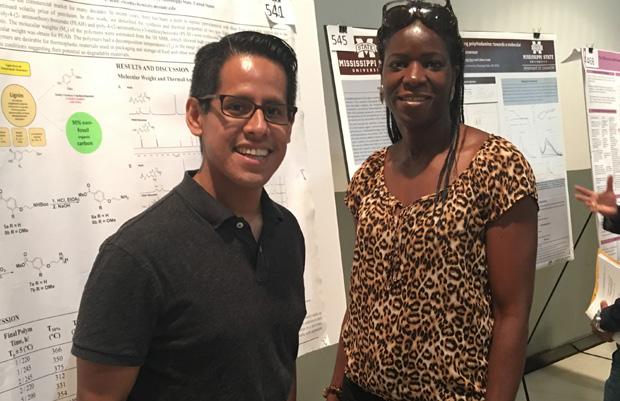
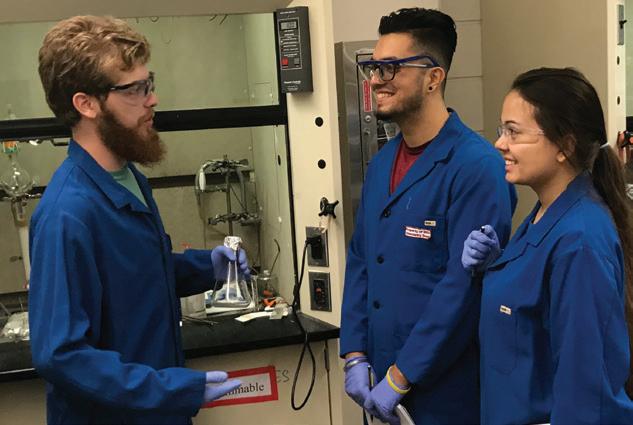
photos were taken pre-covid
common, everyday devices such as TVs, cell phones and medical devices. She said her research is fundamental to the advancement of technologies used to improve and promote human health, prosperity and welfare.
“Longevity in the materials translates to longevity in your devices,” Scott said. “For example, the battery in your phones and laptop computers produces a lot of heat that can, in turn, damage the materials that compose the circuit board. If the circuit board is damaged, then your device will malfunction.”
Scott explained that the conductive materials that make up the circuit board and the emissive materials that provide color in OLEDs are required to be cycled back and forth thousands of times. However, if those materials get damaged during each cycle, then their longevity will decrease.
“Our goal is to increase the stability of these materials to increase their longevity,” she explained.
Scott said she also hopes to motivate and inspire at-risk students to persevere and not only finish their primary education, but also pursue a secondary education and become productive community citizens.
“We all know the contribution Marie Curie has made to the physics world when she was probably only one of a very few, if not the only, renowned female physicists at that time. As more corporations are looking to hire more women in the STEM field, the number of women actually getting to that point is very low,” Scott explained. “Therefore, we need to encourage more ladies to become involved in STEM from an early age and to continue their education to the highest level. Women in STEM are important to corporations because they help change many policies and practices that are harmful to women’s health.”
Scott’s current implementation of “Science with Dr. Scott” at Ms. Smith’s Educational Service in Starkville has integrated polymer chemistry activities for at-risk students into a K-12 learning environment through a summer and after-school tutoring and alternative graduate services program.
“The program is still ongoing and has continued through COVID-19 to help parents who were working on the frontline,” Scott said. “Also, the continuation of the program during this time has ensured that the students did not fall behind in their academic work, which is so important for these students.”
During one summer session, Scott organized a chemistry activity where the students made conductive paper from a silver conducting ink pen to light an LED bulb using a 3V battery.
“The kids, even the older ones, were very engaged and excited when their paper lit up,” she said. “Such activities engage student curiosity, increase enthusiasm for science and motivation to continue their education, and ultimately create an informed citizenry excited about discovery and innovation.”
Scott refers to work in her laboratory as “highly interdisciplinary,” exposing students and post-doctoral fellows to a wide variety of equipment and characterization techniques. Her polymer research has a range of application from adhesives, coatings and industrial fabrics to structural components in construction, biomedical and aerospace industries.
“I am biased,” Scott said. “I believe chemistry is the central science as it contains math, physics and biology. Chemistry is so intertwined with the other sciences that I think it’s very important for all.”
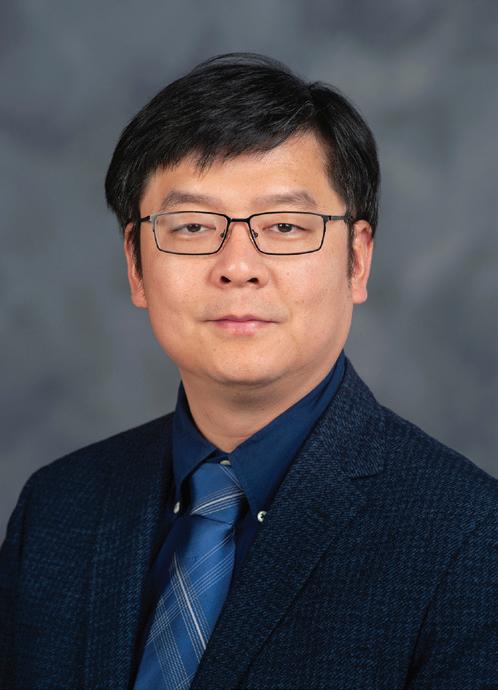
Xin Cui
Assistant Professor of Chemistry
Xin Cui’s CAREER-winning proposal, “RutheniumCatalyzed Stereoselective and Site-selective Functionalization of Carbon-Hydrogen Bond,” is funded with a five-year $650,000 NSF Division of Chemistry award.
His award will help develop new ways to access organic molecules and effective approaches to fill the long-standing gap in the chemistry of stereoselective carbon-hydrogen bond functionalization.
A native of China, Cui received his Ph.D. in 2008 and bachelor’s degree in 2003, both in chemistry, from the University of Science and Technology of China. In 2012, he completed a postdoctoral fellowship in chemistry at the University of South Florida in Tampa. He joined MSU’s faculty in 2016.
Colleen Scott’s $675,000 CAREER award for “Design and Synthesis of Heterocyclic Aryldiamine Polymers: Towards a New Class of Processable and Electrochemically Stable Conducting Materials” is funded for five years by the NSF Division of Chemistry.
Scott’s award will allow her to pursue research ideas for developing materials to be used in a variety of areas of organic electronics, such as sensors, organic magnets, electromagnetic interference shielding and electrochromic materials.
A native of Kingston, Jamaica, Scott earned her Ph.D. from the University of Pittsburgh in 2005 and bachelor’s degree from Auburn University in 1998. She joined MSU’s faculty in 2015.
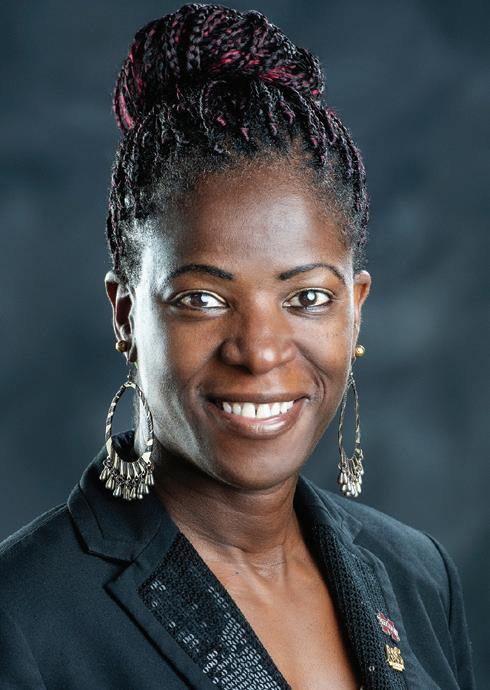
Colleen Scott
Associate Professor of Chemistry
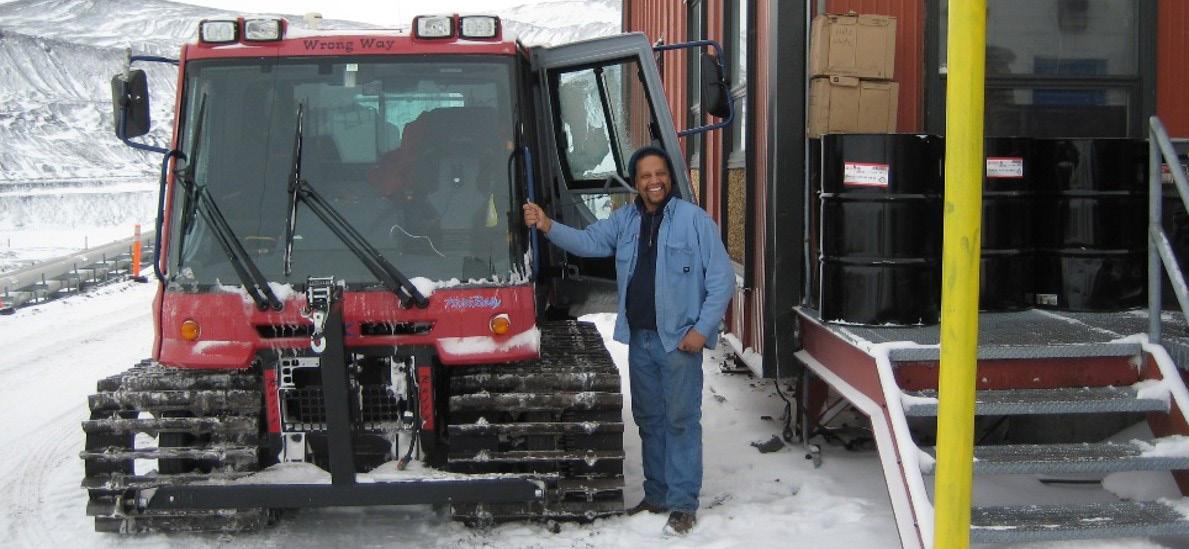
MSU Distance Education student ‘trying to leave something behind’ with master’s degree, opportunities in education
by JoLee Clark
The median age of a typical graduate student now is 33. So what would make someone nearing retirement decide to return to school to pursue a graduate degree? For James Whitley, 67, a California resident, the answer can be found in a line of one of his favorite songs. It says, “I’m just trying to leave something behind.”
The words inspired Whitley to pursue a Master of Science degree in geosciences with a concentration in environmental geosciences at Mississippi State. The degree will allow him to teach after he retires from the electric power industry in the next few years.
Whitley was born in New Orleans, where he spent a great deal of time with his grandmother and family. “A lot of how my character and demeanor was formed by life with that kind, wise, but strict old Southern Baptist woman,” Whitley said.
When he was 9-years-old, Whitley’s mother married and the family relocated to California. His stepfather became a guiding educational influence in Whitley’s life.
“Right after getting my California driver’s license, when many of my friends and classmates were getting keys to automobiles, I was presented with the entire bound set of the 1970 edition of the Encyclopedia Britannica with an atlas and its own wooden case,” he said.
Whitley’s said his meager allowance in those days depended on being able to discuss at the family dinner table the topics he found interesting in the encyclopedias. He admits the gift turned him into a bit of a “geek,” although he also was an award-winning cross-country, wrestling and track star in high school.
“I was lucky to have a brilliant man, my stepfather, push me to be a learned man,” Whitley said. His stepfather, a geochemist, also kindled his interest in geosciences.
“Besides the models I made and comic books, my bedroom was strewn with rocks that he often brought me,” he said.
Nevertheless, geoscience studies would have to wait until Whitley was much older. He entered the U.S. Navy just four days after his high school graduation with the intention of taking advantage of G.I. Bill benefits to help pay for college.
“In hindsight, I can say I had no intention of my Navy experience becoming a career. Twenty-two years, six months and eleven days later, having crossed the equator eight times, been to 12 countries and sailed every ocean except the Artic, I retired from the Navy as a Senior Chief Petty Officer,” Whitley said.
Trained as an electrician and engineer, Whitley has worked in the electric power generation industry since his naval retirement. He said his second career has taken him to some interesting places as well.
“I lived and worked at a powerplant in Bermuda for three years. But the coolest job I’ve ever held was spending 11 months as the utilities plant supervisor for the National Science Foundation at their McMurdo Research Station on the continent of Antarctica,” Whitley said.
When Whitley decided to pursue a graduate degree, he knew he wanted to try something new—something that would allow him to move toward opportunities in teaching. He strongly believes the human
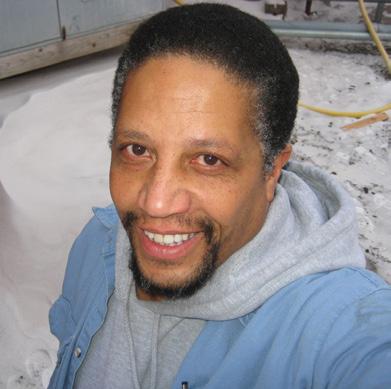
impact on the environment must change. He argues that such change cannot come from his generation and likely not his children’s generation.
“I contend, at least from my own life experiences, that the key to any such change needs to happen by inspiring, educating and guiding our youth,” he said.
Whitley expects to retire from the electric power industry in the next four years. He hopes to make a career move to education at that time. Taking his education and experiences into a classroom of young people will be the fulfillment of his desire to “leave something behind,” just as his parents did.
Whitley attributes his lifelong desire to learn to his parents, who he said continued their educational pursuits well past the typical age. His stepfather earned his bachelor’s degree at 60 and his mother a bachelor’s and master’s at 63 and 74, respectively. His mother was working on her doctorate at the time of her death. Whitley says he can feel them with him each time he logs into classes with Mississippi State Online. “I tell anyone whose ear I can bend, that my educational achievements could have never been accomplished as a full-time working adult with family and other life obligations without online classes,” Whitley said.
For someone who already has had a two-decade career in the U. S. Navy and is a few years shy of retiring as an engineer, beginning a graduate journey in geosciences might seem unexpected. However, James Whitley is determined to leave his mark on “planet earth.”

Mississippi State University Online
@msstateonline
@msstateonline
Mississippi State University Online online.msstate.edu
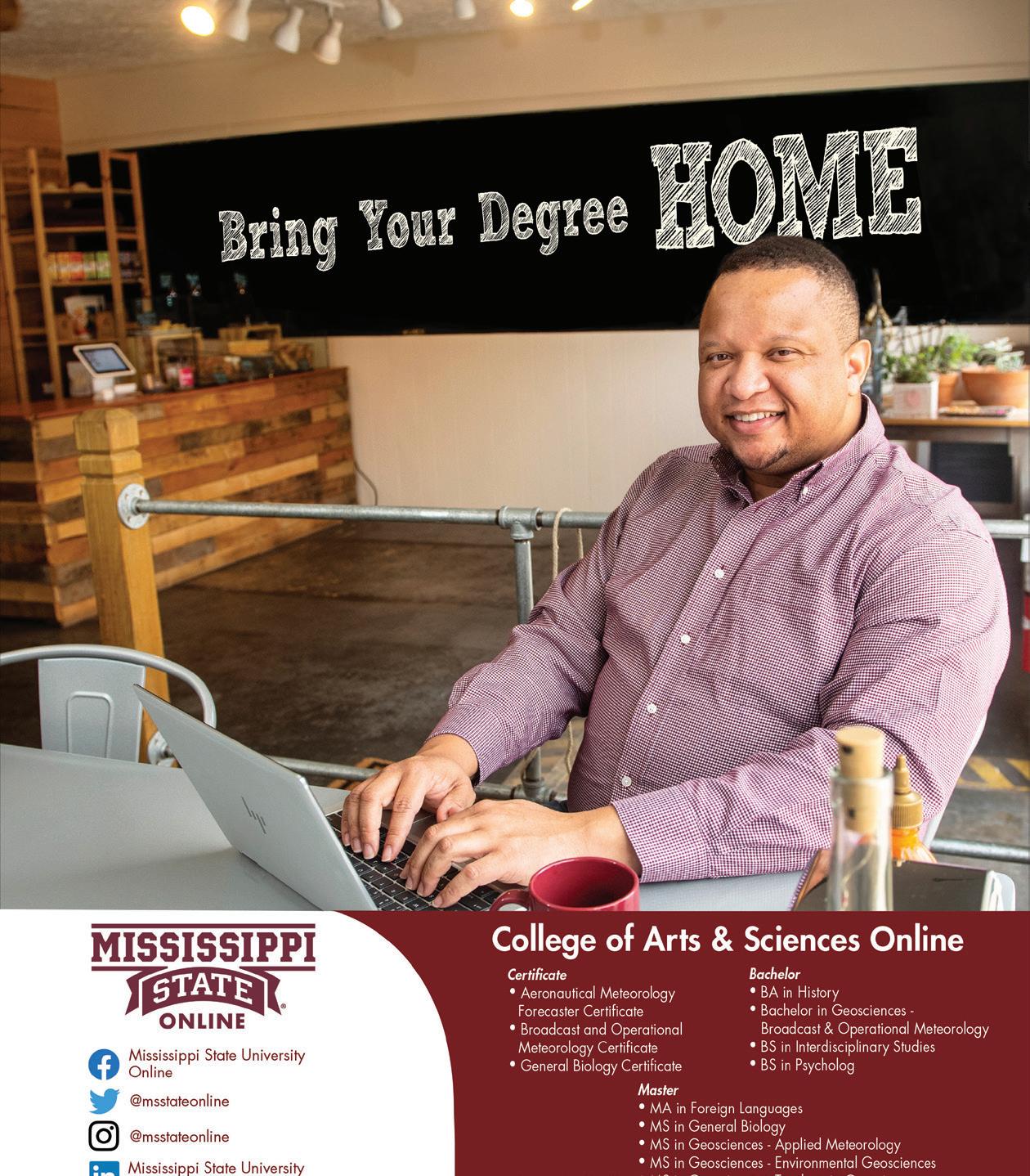
College of Arts & Sciences Online
Certificates • Aeronautical Meteorology
Forecaster Certificate • Broadcast and Operational
Meteorology Certificate • General Biology Certificate • Geospatial and Remote
Sensing Certificate Bachelor’s • BA in History • BS in Geosciences —
Broadcast & Operational Meteorology • BS in Interdisciplinary Studies • BS in Psychology
Master’s • MA in Foreign Languages • MS in General Biology • MS in Geosciences — Applied Meteorology • MS in Geosciences — Environmental Geosciences COLLEGE OF ARTS & SCIENCES | VISION • MS in Geosciences — Teachers in Geosciences 2021
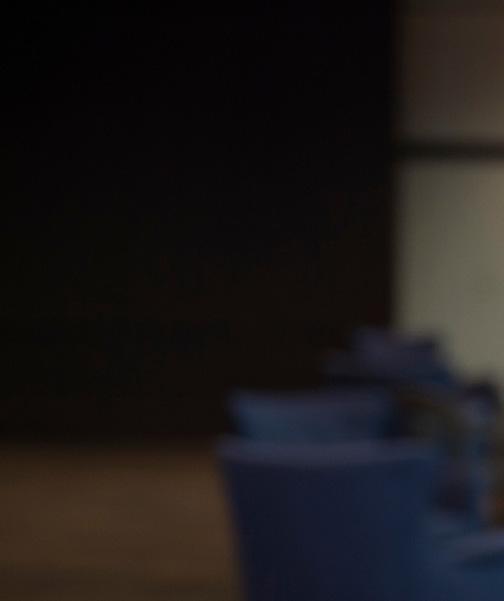
Institute for the Humanities virtual speaker series: HUMANITIES AND SCIENCE MERGED BY COVID-19
By Sarah Nicholas
When COVID-19 emerged last spring, in-person campus events came to a crashing halt at Mississippi State. Julia Osman, director for the College of Arts and Sciences Institute for the Humanities, looked for a way to continue the institute’s annual speaker series despite the pandemic. The difficult time also presented an opportunity to show how COVID-19 demonstrates an important intersection between the humanities and science.
Osman, also an MSU associate professor of history, took the series to an online platform, developing Facebook Live events featuring six sessions on the institute’s Facebook page throughout the quarantine period, each week spotlighting MSU experts on a variety of topics ranging from the environment to medicine.
“The series highlighted how sciences and humanities work together to better inform and educate the public on important matters,” Osman said. “I think this interview series confirmed the humanities and the sciences are inextricably linked. The virus is not just about microbes and vaccines and antibodies, but who is affected and why.”
The format allowed for participant involvement—questions asked and answered in real time—while Osman moderated the Q-and-A-driven session. The audiences were “eager to listen to MSU experts,” offering their advice about how to handle the pandemic, Osman said.
John Burrow, an Institute for the Humanities graduate assistant from South Fulton, TN, came up with the idea of interviewing MSU faculty members virtually after sharing his own interest in hearing what Courtney Thompson, a Department of History faculty member with expertise in the history of medicine, had to say about the pandemic.
“We were hearing so many conflicting stories, and there was so much ‘fake news’ out there,” Osman said. “Like me, I figured many people would want to hear straight information from someone who actually knew what was going on or how to understand what was going on. There must be a lot of people who would love to be able to question an expert and get a better look at things.” The first Facebook Live event in April 2020 featured Thompson, an assistant professor and scholar of the history of 19th-century American medicine, medical humanities and the history of the mind and body. Thompson’s presentation “Understanding ‘the Pandemic’” focused on how historians of medicine think about disease and epidemics/pandemics, and what lessons could be drawn from the past about the current crisis.
“As a historian of medicine, Dr. Thompson helped us understand how COVID-19 fit into the larger history of disease and what it means today,” Osman said.
Another guest, David Hoffman—an associate professor in MSU’s Department of Anthropology and Middle Eastern Cultures who specializes in environmental anthropology and conservation politics— offered insight into the environmental impacts of COVID-19 in his presentation “Is the Pandemic Good for the Environment?”
Hoffman shared with viewers his thoughts on the pandemic’s “massive and overnight shift of the political economic landscape” and the impacts the pandemic is having on the environment.
Hoffman’s episode highlighted the interdependent link between society, people and the natural world and whether or not humanity would learn any lessons
Julia Osman is the director of College of Arts and Sciences Institute for the Humanities and also an associate professor of history
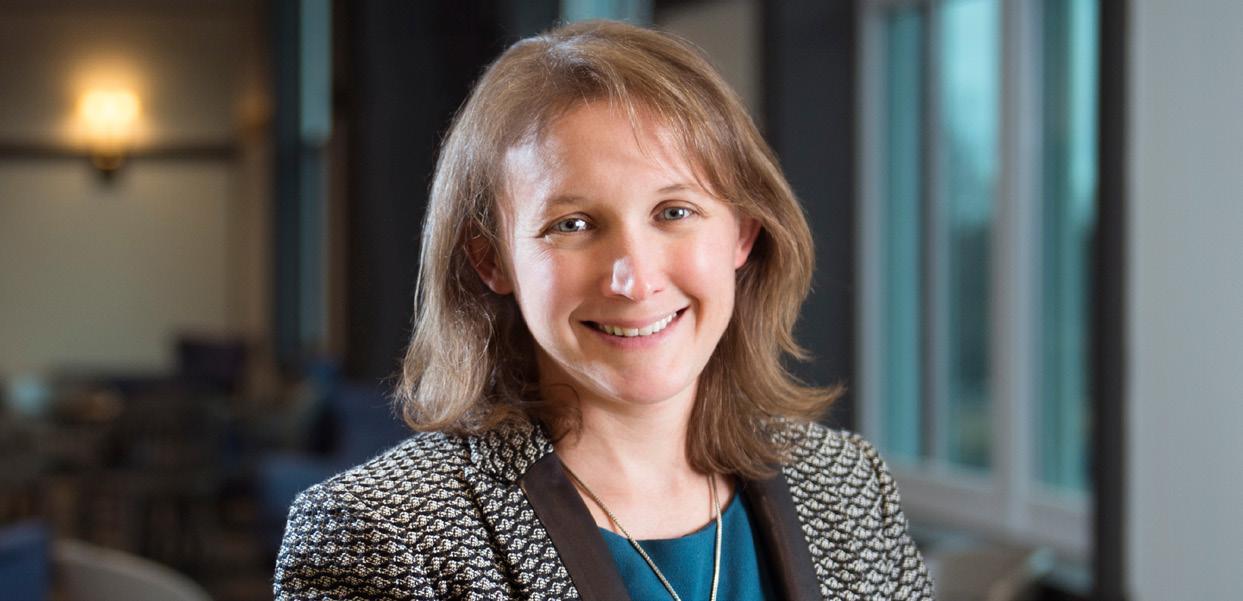
from the shutdown period or try to return to “the way things were.”
Next, Thessalia Merivaki, assistant professor in MSU’s Department of Political Science and Public Administration, shared her perspective on the presidential and senatorial elections and provided expert analysis of the potential impacts COVID-19 could have on the 2020 political processes. In “Preparing for the 2020 Elections,” Merivaki discussed the potential ramifications of how the virus affected the news cycle and Americans’ access to political news.
In mid-May, Davide Orsini, assistant professor in MSU’s Department of History, provided insight from his quarantine location in Germany.
Orsini offered his perspectives on risk, how governments and people have historically handled risk, and the problems associated with risk management during COVID-19. In his presentation “Understanding Risk at the Time of the COVID-19 Pandemic,” Orsini used his international experiences to discuss his perspective of the U.S.’s handling of the virus.
“While there have always been risks associated with everything we do, the virus is forcing us to revisit how we think of the risks we’re taking,” Osman said of Orsini’s presentation.
Dr. Cliff Story, Mississippi State’s director of University Health Services and a physician at MSU’s Longest Student Health Center, then met with Osman to discuss “The Nature of the COVID-19 Beast,” providing his medical expertise on the complicated nature of the virus and what listeners could expect.
The final speaker of the Facebook Live sessions was Anthony Neal, assistant professor in MSU’s Department of Philosophy and Religion and head of the African American Studies program, for a session called “Experiencing Blackness during the Pandemic.”
Neal applied his MSU research for the Facebook event, discussing how African Americans were affected by the disease disproportionally more than other races and often confronted additional difficulties in trying to access health care.
“Community members and academics alike flooded us with questions for Dr. Anthony Neal, who spoke not just about COVID-19, but about the murders of George Floyd and Ahmaud Arbery and the ‘experience of blackness’ in these times— asking him everything from ‘What should churches be doing?’ ‘What should we tell our babies?’ and ‘What are grassroots efforts in Starkville that can help?’” Osman said. “His interview helped the community directly engage with the moment and find meaningful ways to respond.” Visit the Institute for the Humanities on Facebook @msu.humanities.institute to view the archived Facebook Live videos.
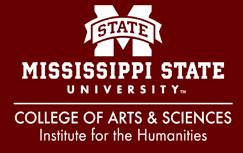
As part of MSU’s College of Arts and Sciences, the Institute for the Humanities promotes research, scholarship and creative performances in the humanistic disciplines and raises their visibility, both within the university and the wider community.




